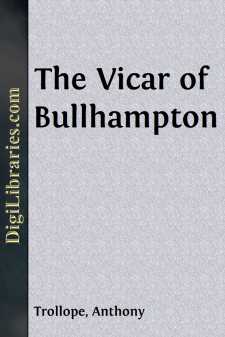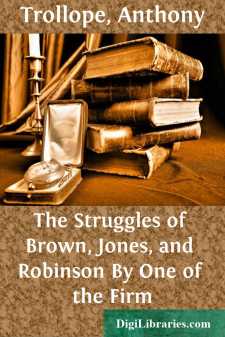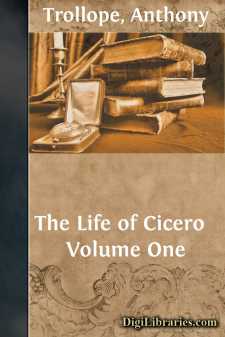Categories
- Antiques & Collectibles 13
- Architecture 36
- Art 48
- Bibles 22
- Biography & Autobiography 813
- Body, Mind & Spirit 142
- Business & Economics 28
- Children's Books 17
- Children's Fiction 14
- Computers 4
- Cooking 94
- Crafts & Hobbies 4
- Drama 346
- Education 46
- Family & Relationships 57
- Fiction 11829
- Games 19
- Gardening 17
- Health & Fitness 34
- History 1377
- House & Home 1
- Humor 147
- Juvenile Fiction 1873
- Juvenile Nonfiction 202
- Language Arts & Disciplines 88
- Law 16
- Literary Collections 686
- Literary Criticism 179
- Mathematics 13
- Medical 41
- Music 40
- Nature 179
- Non-Classifiable 1768
- Performing Arts 7
- Periodicals 1453
- Philosophy 64
- Photography 2
- Poetry 896
- Political Science 203
- Psychology 42
- Reference 154
- Religion 513
- Science 126
- Self-Help 84
- Social Science 81
- Sports & Recreation 34
- Study Aids 3
- Technology & Engineering 59
- Transportation 23
- Travel 463
- True Crime 29
Anthony Trollope
Anthony Trollope (1815-1882) was a prolific English novelist best known for his series of novels set in the fictional county of Barsetshire, including "Barchester Towers" and "The Last Chronicle of Barset." His works, often exploring the intricacies of Victorian society and politics, feature complex characters and detailed social commentary. Trollope also had a notable career in the British postal service, where he is credited with introducing the red pillar box (mailbox).
Author's Books:
Sort by:
by:
Anthony Trollope
CHAPTER I. Three Editors Let the reader be introduced to Lady Carbury, upon whose character and doings much will depend of whatever interest these pages may have, as she sits at her writing-table in her own room in her own house in Welbeck Street. Lady Carbury spent many hours at her desk, and wrote many letters,—wrote also very much beside letters. She spoke of herself in these days as a woman...
more...
by:
Anthony Trollope
Chapter I Hiram's Hospital The Rev. Septimus Harding was, a few years since, a beneficed clergyman residing in the cathedral town of ––––; let us call it Barchester. Were we to name Wells or Salisbury, Exeter, Hereford, or Gloucester, it might be presumed that something personal was intended; and as this tale will refer mainly to the cathedral dignitaries of the town in question, we are...
more...
by:
Anthony Trollope
PREFACE. The writing of prefaces is, for the most part, work thrown away; and the writing of a preface to a novel is almost always a vain thing. Nevertheless, I am tempted to prefix a few words to this novel on its completion, not expecting that many people will read them, but desirous, in doing so, of defending myself against a charge which may possibly be made against me by the critics,—as to which...
more...
by:
Anthony Trollope
INTRODUCTION There is the proper mood and the just environment for the reading as well as for the writing of works of fiction, and there can be no better place for the enjoying of a novel by Anthony Trollope than under a tree in Kensington Gardens of a summer day. Under a tree in the avenue that reaches down from the Round Pond to the Long Water. There, perhaps more than anywhere else, lingers the...
more...
by:
Anthony Trollope
PREFACE. BY ONE OF THE FIRM. It will be observed by the literary and commercial world that, in this transaction, the name of the really responsible party does not show on the title-page. I—George Robinson—am that party. When our Mr. Jones objected to the publication of these memoirs unless they appeared as coming from the firm itself, I at once gave way. I had no wish to offend the firm, and,...
more...
by:
Anthony Trollope
CHAPTER I Of course there was a Great House at Allington. How otherwise should there have been a Small House? Our story will, as its name imports, have its closest relations with those who lived in the less dignified domicile of the two; but it will have close relations also with the more dignified, and it may be well that I should, in the first instance, say a few words as to the Great House and its...
more...
by:
Anthony Trollope
Ferdinand Lopez It is certainly of service to a man to know who were his grandfathers and who were his grandmothers if he entertain an ambition to move in the upper circles of society, and also of service to be able to speak of them as of persons who were themselves somebodies in their time. No doubt we all entertain great respect for those who by their own energies have raised themselves in the...
more...
by:
Anthony Trollope
CHAPTER I. BALLYCLORAN HOUSE AS FIRST SEEN BY THE AUTHOR. In the autumn, 184—, business took me into the West of Ireland, and, amongst other places, to the quiet little village of Drumsna, which is in the province of Connaught, County Leitrim, about 72 miles w.n.w. of Dublin, on the mail-coach road to Sligo. I reached the little inn there in the morning by the said mail, my purpose being to leave...
more...
by:
Anthony Trollope
Chapter I. INTRODUCTION. I am conscious of a certain audacity in thus attempting to give a further life of Cicero which I feel I may probably fail in justifying by any new information; and on this account the enterprise, though it has been long considered, has been postponed, so that it may be left for those who come after me to burn or publish, as they may think proper; or, should it appear during my...
more...
by:
Anthony Trollope
Chapter I. HIS RETURN FROM EXILE. Cicero's life for the next two years was made conspicuous by a series of speeches which were produced by his exile and his return. These are remarkable for the praise lavished on himself, and by the violence with which he attacked his enemies. It must be owned that never was abuse more abusive, or self-praise uttered in language more laudatory. Cicero had now done...
more...











